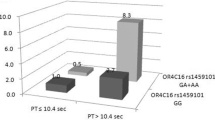Abstract
Purpose
The role of genetic polymorphisms in the pathogenesis of recurrent pregnancy loss (RPL) has been studied intensively. Complex diseases, including miscarriage, are believed to have a polygenic basis, and gene–gene interactions can play a significant role in the etiology of the disease. This study was conducted to investigate the association of gene–gene interactions with angiogenesis, endothelial dysfunction-related gene polymorphisms, and RPL.
Methods
A case–control study was conducted with 253 unrelated RPL patients with 2 or more spontaneous pregnancy losses and 339 healthy women with no history of pregnancy complications. Genotyping of single-nucleotide polymorphisms (SNPs) was performed using real-time polymerase chain reaction (real-time PCR), restriction fragment length polymorphism (RFLP), or allele-specific polymerase chain reaction methods.
Results
The genotypes 677TT of the MTHFR gene, 936TT, 936CT, and 634CC, 634GC of the VEGF gene, and allele 894T of the NOS3 gene were associated with a predisposition to RPL in the Russian population. A significant role of additive and epistatic effects in the gene–gene interactions of the SNPs of SERPINE-1, ACE, NOS3, MTHFR, and VEGF genes in RPL was demonstrated.
Conclusions
The results showed that gene–gene interactions are important for RPL susceptibility. Additionally, analysis of the genotype combinations of several allelic variants provides more information on RPL risk than analysis of independent polymorphic markers.


Similar content being viewed by others
References
Page JM, Silver RM. Genetic causes of recurrent pregnancy loss. Clin Obstet Gynecol. 2016;59:498–508. https://doi.org/10.1097/GRF.0000000000000217.
Rull K, Nagirnaja L, Laan M. Genetics of recurrent miscarriage: challenges, current knowledge, future directions. Front Genet. 2012;3(34):1–13.
Sergi C, Al Jishi T, Walker M. Factor V Leiden mutation in women with early recurrent pregnancy loss: a meta-analysis and systematic review of the causal association. Arch Gynecol Obstet. 2015;291(3):671–9.
Kolte AM, Nielsen HS, Steffensen R, et al. Inheritance of the 8.1 ancestral haplotype in recurrent pregnancy loss. Evol Med Public Health. 2015;2015(1):325–31.
Shi X, Xie X, Jia Y, Li S. Maternal genetic polymorphisms and unexplained recurrent miscarriage: a systematic review and meta-analysis. Clin Genet. 2017;91(2):265–84.
Yu W, Gwinn M, Clyne M, Yesupriya A, Khoury MJ. A navigator for human genome epidemiology. Nat Genet. 2008;40(2):124–5.
Arias-Sosa LA, Acosta ID, Lucena-Quevedo E, Moreno-Ortiz H, Esteban-Pérez C, Forero-Castro M. Genetic and epigenetic variations associated with idiopathic recurrent pregnancy loss. J Assist Reprod Genet. 2018;35(3):355–66.
Pereza N, Ostojić S, Kapović M, Peterlin B. Systematic review and meta-analysis of genetic association studies in idiopathic recurrent spontaneous abortion. Fertil Steril. 2017;107(1):150–9.
Trifonova EA, Ganzha OA, Gabidulina TV, et al. Genetic factors in the development of recurrent miscarriage: an overview of the data of meta-analyses. Obstet Ginecol. 2017. https://doi.org/10.18565/aig.2017.4.14-20.
Tang W, Zhou X, Chan Y, Wu X, Luo Y. p53 codon 72 polymorphism and recurrent pregnancy loss: a meta-analysis. J Assist Reprod Genet. 2011;28(10):965–9.
Chen H, Yang X, Wang Z. Association between p53 Arg72Pro polymorphism and recurrent pregnancy loss: an updated systematic review and meta-analysis. Reprod BioMed Online. 2015;31(2):149–53.
Li X, Liu Y, Zhang R, Tan J, Chen L, Liu Y. Meta-analysis of the association between plasminogen activator inhibitor-1 4G/5G polymorphism and recurrent pregnancy loss. Med Sci Monit. 2015;21:1051–6.
Zhang B, Dai B, Zhang X, Wang Z. Vascular endothelial growth factor and recurrent spontaneous abortion: a meta-analysis. Gene. 2012;507(1):1–8.
Cao Y, Xu J, Zhang Z, Huang X, Zhang A, Wang J, et al. Association study between methylenetetrahydrofolate reductase polymorphisms and unexplained recurrent pregnancy loss: a meta-analysis. Gene. 2013;514:105–11.
Chen H, Yang X, Lu M. Methylenetetrahydrofolate reductase gene polymorphisms and recurrent pregnancy loss in China: a systematic review and meta-analysis. Arch Gynecol Obstet. 2016;293(2):283–90.
Ren A, Wang J. Methylenetetrahydrofolate reductase C677T polymorphism and the risk of unexplained recurrent pregnancy loss: a meta-analysis. Fertil Steril. 2006;86(6):1716–22.
Pereza N, Peterlin B, Volk M, Kapović M, Ostojić S. A critical update on endothelial nitric oxide synthase gene variations in women with idiopathic recurrent spontaneous abortion: genetic association study, systematic review and meta-analyses. Mol Hum Reprod. 2015;21(5):466–78.
Su MT, Lin SH, Chen YC. Genetic association studies of angiogenesis- and vasoconstriction-related genes in women with recurrent pregnancy loss: a systematic review and meta-analysis. Hum Reprod Update. 2011;17(6):803–12.
Cao Y, Zhang Z, Xu J, Wang J, Yuan W, Shen Y, et al. Genetic association studies of endothelial nitric oxide synthase gene polymorphisms in women with unexplained recurrent pregnancy loss: a systematic and meta-analysis. Mol Biol Rep. 2014;41(6):3981–9.
Yang C, Fangfang W, Jie L, Yanlong Y, Jie W, Xuefei L, et al. Angiotensin-converting enzyme insertion/deletion (I/D) polymorphisms and recurrent pregnancy loss: a meta-analysis. J Assist Reprod Genet. 2012;29(1):1167–73.
Xu X, Du C, Li H, et al. Association of VEGF genetic polymorphisms with recurrent spontaneous abortion risk: a systematic review and meta-analysis. PLoS One. 2015;10. https://doi.org/10.1371/journal.pone.0123696.
Su MT, Lin SH, Chen YC, Kuo PL. Genetic association studies of ACE and PAI-1 genes in women with recurrent pregnancy loss. Thromb Haemost. 2013;109(1):8–15.
Chen H, Nie S, Lu M. Association between plasminogen activator Inhibitor-1 gene polymorphisms and recurrent pregnancy loss: a systematic review and meta-analysis. Am J Reprod Immunol. 2015;73(4):292–300.
Wang Z, Wang P, Wang X. Significant association between angiotensin-converting enzyme gene insertion/deletion polymorphism and risk of recurrent miscarriage: a systematic review and meta-analysis. Metabolism. 2013;62(9):1227–38.
Aschard H, Lutz S, Maus B, Duell EJ, Fingerlin TE, Chatterjee N, et al. Challenges and opportunities in genome-wide environmental interaction (GWEI) studies. Hum Genet. 2012;131(10):1591–613.
Marian AJ. Elements of ‘missing heritability’. Curr Opin Cardiol. 2012;27(3):197–201.
Cole BS, Hall MA, Urbanowicz RJ, et al. Analysis of gene-gene interactions. Curr Protoc Hum Genet. 2017. https://doi.org/10.1002/cphg.45.
Nasr HB, Dimassi S, M’hadhbi R, Debbabi H, Kortas M, Tabka Z, et al. Functional G894T (rs1799983) polymorphism and intron-4 VNTR variant of nitric oxide synthase (NOS3) gene are susceptibility biomarkers of obesity among Tunisians. Obes Res Clin Pract. 2016;10(4):465–75.
Blasiak J, Smolarz B. Plasminogen activator inhibitor-1 (PAI-1) gene 4G/5G promoter polymorphism is not associated with breast cancer. Acta Biochim Pol. 2000;47(1):191–9.
Kalita J, Somarajan BI, Kumar B, Mittal B, Misra UK. A study of ACE and ADD1 polymorphism in ischemic and hemorrhagic stroke. Clin Chim Acta. 2011;412(7–8):642–6.
El-Aziz TAA, Mohamed RH. Influence of MTHFR C677T gene polymorphism in the development of cardiovascular disease in Egyptian patients with rheumatoid arthritis. Gene. 2017;610:127–32.
Barrett JC, Fry B, Maller J, Daly MJ. Haploview: analysis and visualization of LD and haplotype maps. Bioinformatics. 2005;21(2):263–5.
dbSNP; https://www.ncbi. nlm.nih.gov/snp
Chung Y, Lee SY, Elston RC, Park T. Odds ratio based multifactor-dimensionality reduction method for detecting gene–gene interactions. Bioinformatics. 2007;23(1):71–6.
Yousefian E, Kardi MT, Allahveisi A. Methylenetetrahydrofolate reductase C677T and A1298C polymorphism in Iranian women with idiopathic recurrent pregnancy losses. Iranian Red Crescent Med J. 2014;16(7):1–4.
Isaoglu U, Ulug P, Delibas IB, et al. The association between inherited thrombophilia and recurrent pregnancy loss in Turkish women. Clin Exp Obstet Gynecol. 2014;41(2):177–81.
Bozikova A, Gabrikova D, Pitonak J, Bernasovska J, Macekova S, Lohajova-Behulova R. Ethnic differences in the association of thrombophilic polymorphisms with obstetric complications in Slovak and Roma (Gypsy) populations. Genet Test Mol Biomarkers. 2015;19(2):98–102.
Parveen F, Faridi RM, Alam S, Agrawal S. Genetic analysis of eNOS gene polymorphisms in association with recurrent miscarriage among North Indian women. Reprod BioMed Online. 2011;23(1):124–31.
Banerjee P, Ghosh S, Dutta M, Subramani E, Khalpada J, RoyChoudhury S, et al. Identification of key contributory factors responsible for vascular dysfunction in idiopathic recurrent spontaneous miscarriage. PLoS One. 2013;8. https://doi.org/10.1371/journal.pone.0080940.
Najafi T, Novin MG, Ghazi R, Khorram O. Altered endometrial expression of endothelial nitric oxide synthase in women with unexplained recurrent miscarriage and infertility. Reprod BioMed Online. 2012;25(4):408–14.
Luo L, Li DH, Wei SG, Zhang HB, Li SB, Zhao J. Polymorphisms in the endothelial nitric oxide synthase gene associated with recurrent miscarriage. Genet Mol Res. 2013;12(3):3879–86.
Shin SJ, Lee HH, Cha SH, Kim JH, Shim SH, Choi DH, et al. Endothelial nitric oxide synthase gene polymorphisms (− 786T> C, 4a4b, 894G> T) and haplotypes in Korean patients with recurrent spontaneous abortion. Eur J Obstet Gynecol Reprod Biol. 2010;152(1):64–7.
Zammiti W, Mtiraoui N, Mahjoub T. Lack of consistent association between endothelial nitric oxide synthase gene polymorphisms, homocysteine levels and recurrent pregnancy loss in Tunisian women. Am J Reprod Immunol. 2008;59(2):139–45.
Lee HH, Hong SH, Shin SJ, Ko JJ, Oh D, Kim NK. Association study of vascular endothelial growth factor polymorphisms with the risk of recurrent spontaneous abortion. Fertil Steril. 2010;93(4):1244–7.
Traina E, Daher S, Moron AF, Sun SY, Franchim CS, Mattar R. Polymorphisms in VEGF, progesterone receptor and IL-1 receptor genes in women with recurrent spontaneous abortion. J Reprod Immunol. 2011;88(1):53–7.
Papazoglou D, Galazios G, Papatheodorou K, Liberis V, Papanas N, Maltezos E, et al. Vascular endothelial growth factor gene polymorphisms and idiopathic recurrent pregnancy loss. Fertil Steril. 2005;83(4):959–63.
Lash GE, Cartwright JE, Whitley GS. The effects of angiogenic growth factors on extravillous trophoblast invasion and motility. Placenta. 1999;20:661–7.
Yalcintepe SA, Silan F, Hacivelioglu SO, et al. Fetal VEGF genotype is more important for abortion risk than mother genotype. Int J Mol Cell Med. 2014;3(2):88–94.
Amirchaghmaghi E, Rezaei A, Moini A, et al. Gene expression analysis of VEGF and its receptors and assessment of its serum level in unexplained recurrent spontaneous abortion. Cell J. 2015;4(16):538–45.
Galazios G, Papazoglou D, Tsikouras P, Kolios G. Vascular endothelial growth factor gene polymorphisms and pregnancy. J Matern Fetal Neonatal Med. 2009;22(5):371–8.
Andraweera PH, Dekker GA, Roberts CT. The vascular endothelial growth factor family in adverse pregnancy outcomes. Hum Reprod Update. 2012;18(4):436–57.
Sun L, Lv H, Wei W, Zhang D, Guan Y. Angiotensin-converting enzyme D/I and plasminogen activator inhibitor-1 4G/5G gene polymorphisms are associated with increased risk of spontaneous abortions in polycystic ovarian syndrome. J Endocrinol Investig. 2010;33(2):77–82.
Labied S, Blacher S, Carmeliet P, Noël A, Frankenne F, Foidart JM, et al. Transient reduction of placental angiogenesis in PAI-1-deficient mice. Physiol Genomics. 2011;43(4):188–98.
Subrt I, Ulcova-Gallova Z, Cerna M, Hejnalova M, Slovanova J, Bibkova K, et al. Recurrent pregnancy loss, plasminogen activator inhibitor-1 (-675) 4G/5G polymorphism and antiphospholipid antibodies in Czech women. Am J Reprod Immunol. 2013;70(1):54–8.
Kim JJ, Choi YM, Lee SK, Yang KM, Paik EC, Jeong HJ, et al. The PAI-1 4G/5G and ACE I/D polymorphisms and risk of recurrent pregnancy loss: a case–control study. Am J Reprod Immunol. 2014;72(6):571–6.
Serrano NC, Díaz LA, Páez MC, Mesa CM, Cifuentes R, Monterrosa A, et al. Angiotensin-converting enzyme I/D polymorphism and pre-eclampsia risk: evidence of small-study bias. PLoS Med. 2006;3. https://doi.org/10.1371/journal.pmed.0030520.
Kim DK, Kim JW, Kim S, Gwon HC, Ryu JC, Huh JE, et al. Polymorphism of angiotensin converting enzyme gene is associated with circulating levels of plasminogen activator inhibitor-1. Arterioscler Thromb Vasc Biol. 1997;17:3242–7.
Al Sallout RJ, Sharif FA. Polymorphisms in NOS3, ACE and PAI-1 genes and risk of spontaneous recurrent miscarriage in the Gaza Strip. Med Princ Pract. 2010;19(2):99–104.
Floridon C, Nielsen O, Hølund B, Sweep F, Sunde L, Thomsen SG, et al. Does plasminogen activator inhibitor-1 (PAI-1) control trophoblast invasion? A study of fetal and maternal tissue in intrauterine, tubal and molar pregnancies. Placenta. 2000;21(8):754–62.
Dossenbach-Glaninger A, van Trotsenburg M, Schneider B, Oberkanins C, Hopmeier P. ACE I/D polymorphism and recurrent first trimester pregnancy loss: interaction with SERPINE1 4G/5G and F13 Val34Leu polymorphisms. Br J Haematol. 2008;141(2):269–71.
Buchholz T, Lohse P, Rogenhofer N, et al. Polymorphisms in the ACE and PAI-1 genes are associated with recurrent spontaneous miscarriages. Hum Reprod. 2003;18(11):2473–7.
Funding
The work received financial support from the Russian Foundation for Basic Research (grant no. 18-44-700007).
Author information
Authors and Affiliations
Corresponding author
Ethics declarations
This study was approved by the Research Ethics Committee of the Institute for Medical Genetics of Tomsk city. Informed consent was obtained from all individual participants included in the study.
Conflict of interest
The authors declare that they have no competing interests.
Additional information
Publisher’s Note
Springer Nature remains neutral with regard to jurisdictional claims in published maps and institutional affiliations.
Rights and permissions
About this article
Cite this article
Trifonova, E.A., Swarovskaya, M.G., Ganzha, O.A. et al. The interaction effect of angiogenesis and endothelial dysfunction-related gene variants increases the susceptibility of recurrent pregnancy loss. J Assist Reprod Genet 36, 717–726 (2019). https://doi.org/10.1007/s10815-019-01403-2
Received:
Accepted:
Published:
Issue Date:
DOI: https://doi.org/10.1007/s10815-019-01403-2




